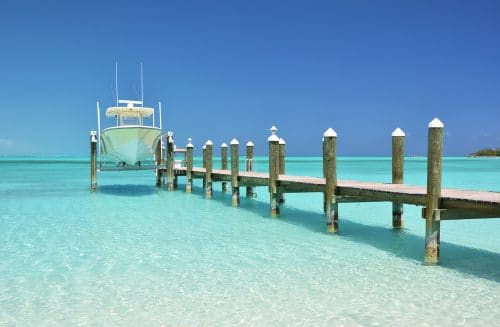BAHAMAS VACCINES AND TRAVEL HEALTH ADVICE

The Bahamas is composed of more than 700 islands and 2000 small cays spread out across the Caribbean Sea. Located near Florida, the Bahamas is a very popular holiday destination for Canadians. Christopher Columbus was the first to discover the archipelago, which later hosted pirates, rum smugglers and British settlers, before welcoming tourists from all over the world. With pristine beaches fringed by palm trees, deep blue waters and beautiful coral reefs, the Bahamas is a true paradise which has something to offer to everyone. Party in Nassau, try big game fishing in Bimini island or escape the tourist crowds in the peaceful Family islands…
What vaccines are needed to travel to the Bahamas In 2024
The Government of Canada and the CDC recommend the following vaccines for travel to the Bahamas In 2024: Traveler’s diarrhea, Typhoid, Hepatitis A, Hepatitis B, Rabies, Influenza, COVID-19.
HEALTH ADVICE FOR TRAVEL TO THE BAHAMAS
Risk of Zika in the Bahamas Learn More >>
We make every effort to ensure that the information posted on our website is up to date and accurate according to the latest public health recommendations; however, it is impossible for us to make changes on a daily basis.
For the most current travel health recommendations, please call our clinic as make an appointment with one of our travel health professionals.
BAHAMAS – RECOMMENDED VACCINES
| Yellow Fever |
A proof of vaccination against yellow fever may be required upon entry in to this country. Some travellers may not be eligible to receive this vaccine. Please enquire with your health care professional regarding your specific details. For further information, please consult with the World Health Organization (WHO) website: |
| Hepatitis A | Recommended for all travellers. |
| Tetanus – Diphtheria – Pertussis |
Tetanus: In exceptional circumstances (eg, stay in a region where access to health care is limited), for a person aged 18 years or older, 1 dose of DT may be given if 5 years or more has elapsed since the last dose. Pertussis (Whooping Cough): 1 dose is recommended for pregnant women, for every pregnancy, regardless of immunization history and the interval since the last dose (between week 26 and 32). *Only applicable for Quebec. |
| Measles – Rubella – Mumps | Two doses recommended for all travellers born after 1970, if not previously given. |
| Rabies | For travellers at high risk of animal bites or being involved in activities with bats. Clients who plan to visit remote areas may consider receiving this vaccine. Important to note the pre-exposure rabies vaccine is administered in 2 doses with one week interval between doses. Post-exposure vaccination is always recommended, even for those previously vaccinated. |
| Flu – Influenza | Seasonal influenza occurs worldwide. The flu season usually runs from November to April in the northern hemisphere, between April and October in the southern hemisphere and year round in the tropics. Influenza (flu) is caused by a virus spread from person to person through coughing and sneezing or by touching infected surfaces. Everyone 6 months and older should get a flu vaccine yearly. Vaccine is recommended 14 days prior to departure. |
| Routine vaccines (dCaT, Polio, Meningococcal, Shingles, Pneumococcal, Hepatitis B, HPV, MMR & Varicella) | Recommended for all travellers |
| Typhoid fever | Recommended for most travellers, especially those who are staying with friends or relatives; visiting smaller cities, villages, or rural areas where exposure might occur through food or water; or prone to “adventurous eating” |
| Hepatitis B | Consider for most travellers; recommended for those who might be exposed to blood or other body fluids, have sexual contact with the local population, or be exposed through medical treatment (e.g., for an accident). |
| African Tick Bite Fever | Could be present. All travellers should protect themselves against tick bites. |
| Traveler’s Diarrhea (ETEC) | Talk to your health care professional about the risks and precautionary measures to take, as well as the Dukoral® vaccine. Important to note that the Dukoral vaccine is an oral vaccine given in 2 doses, recommended at least 2 weeks prior to departure. |
| Dengue Fever, Chikungunya and/or Zika | There are many illnesses that are transmitted via mosquito bites and unfortunately we do not have vaccines to protect us against most of them. It is important to inquire with your healthcare professional regarding the specific risks and the different illnesses presently in circulation. |
RECOMMENDED MEDICATIONS For travel IN THE Bahamas
| Antibiotics Traveler’s Diarrhea | Ciprofloxacin, Azithromycin or Suprax. |
MEDICAL CARE IN the Bahamas
The Bahamas’ health care system is excellent. Most of the doctors and specialists in the Bahamas have studied in the United States, the United Kingdom or Canada. Modern and well equipped health facilities can be found in Nassau and Freeport. They provide health care of high quality, but the medical fees and treatments remain quite expensive. The Princess Margaret Hospital in Nassau is a particularly good establishment and has emergency surgery services. The Doctors Hospital, also located in the capital city, has modern and complete medical equipment. Unfortunately, there are often blood shortages in the Bahamas, which affect emergency care. The Lyford Cay Hospital (242-362-4400) is able to take in scuba diving accidents and is accessible 24 hours a day.
If you need an ambulance in the Bahamas, call 911.
Outside of Nassau and Freeport, it is sometimes hard to find a pharmacy. Don’t forget to bring your own well filled first aid kit.
SECURITY ABROAD
There has been a decrease in violent crime since the beginning of 2018. Crime, however, including violent crime, still occurs, mainly on the islands of Grand Bahama and New Providence.
Emergency services for the Bahamas
Dial 911 or 919 for emergency assistance.
